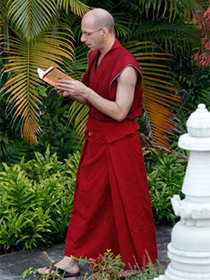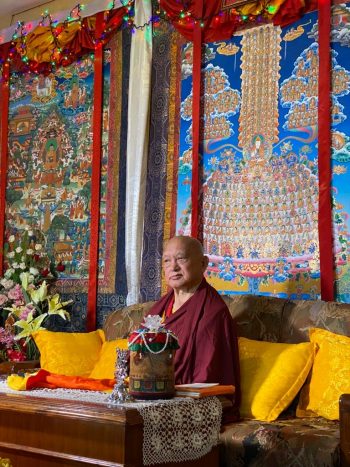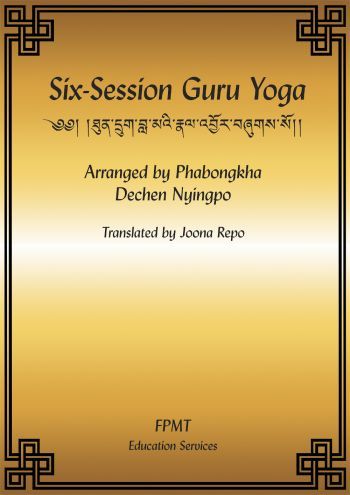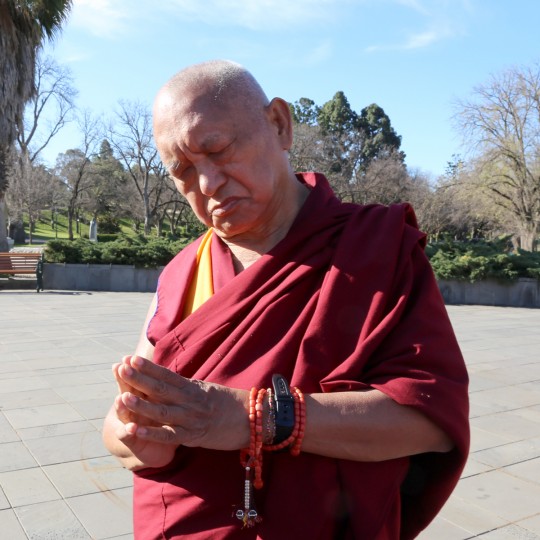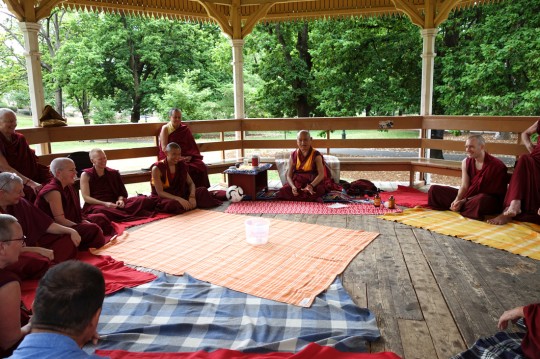- Home
- FPMT Homepage
Foundation for the Preservation of the Mahayana Tradition
The FPMT is an organization devoted to preserving and spreading Mahayana Buddhism worldwide by creating opportunities to listen, reflect, meditate, practice and actualize the unmistaken teachings of the Buddha and based on that experience spreading the Dharma to sentient beings. We provide integrated education through which people’s minds and hearts can be transformed into their highest potential for the benefit of others, inspired by an attitude of universal responsibility and service. We are committed to creating harmonious environments and helping all beings develop their full potential of infinite wisdom and compassion. Our organization is based on the Buddhist tradition of Lama Tsongkhapa of Tibet as taught to us by our founders Lama Thubten Yeshe and Lama Thubten Zopa Rinpoche.
- Willkommen
Die Stiftung zur Erhaltung der Mahayana Tradition (FPMT) ist eine Organisation, die sich weltweit für die Erhaltung und Verbreitung des Mahayana-Buddhismus einsetzt, indem sie Möglichkeiten schafft, den makellosen Lehren des Buddha zuzuhören, über sie zur reflektieren und zu meditieren und auf der Grundlage dieser Erfahrung das Dharma unter den Lebewesen zu verbreiten.
Wir bieten integrierte Schulungswege an, durch denen der Geist und das Herz der Menschen in ihr höchstes Potential verwandelt werden zum Wohl der anderen – inspiriert durch eine Haltung der universellen Verantwortung und dem Wunsch zu dienen. Wir haben uns verpflichtet, harmonische Umgebungen zu schaffen und allen Wesen zu helfen, ihr volles Potenzial unendlicher Weisheit und grenzenlosen Mitgefühls zu verwirklichen.
Unsere Organisation basiert auf der buddhistischen Tradition von Lama Tsongkhapa von Tibet, so wie sie uns von unseren Gründern Lama Thubten Yeshe und Lama Thubten Zopa Rinpoche gelehrt wird.
- Bienvenidos
La Fundación para la preservación de la tradición Mahayana (FPMT) es una organización que se dedica a preservar y difundir el budismo Mahayana en todo el mundo, creando oportunidades para escuchar, reflexionar, meditar, practicar y actualizar las enseñanzas inconfundibles de Buda y en base a esa experiencia difundir el Dharma a los seres.
Proporcionamos una educación integrada a través de la cual las mentes y los corazones de las personas se pueden transformar en su mayor potencial para el beneficio de los demás, inspirados por una actitud de responsabilidad y servicio universales. Estamos comprometidos a crear ambientes armoniosos y ayudar a todos los seres a desarrollar todo su potencial de infinita sabiduría y compasión.
Nuestra organización se basa en la tradición budista de Lama Tsongkhapa del Tíbet como nos lo enseñaron nuestros fundadores Lama Thubten Yeshe y Lama Zopa Rinpoche.
A continuación puede ver una lista de los centros y sus páginas web en su lengua preferida.
- Bienvenue
L’organisation de la FPMT a pour vocation la préservation et la diffusion du bouddhisme du mahayana dans le monde entier. Elle offre l’opportunité d’écouter, de réfléchir, de méditer, de pratiquer et de réaliser les enseignements excellents du Bouddha, pour ensuite transmettre le Dharma à tous les êtres. Nous proposons une formation intégrée grâce à laquelle le cœur et l’esprit de chacun peuvent accomplir leur potentiel le plus élevé pour le bien d’autrui, inspirés par le sens du service et une responsabilité universelle. Nous nous engageons à créer un environnement harmonieux et à aider tous les êtres à épanouir leur potentiel illimité de compassion et de sagesse. Notre organisation s’appuie sur la tradition guéloukpa de Lama Tsongkhapa du Tibet, telle qu’elle a été enseignée par nos fondateurs Lama Thoubtèn Yéshé et Lama Zopa Rinpoché.
Visitez le site de notre Editions Mahayana pour les traductions, conseils et nouvelles du Bureau international en français.
Voici une liste de centres et de leurs sites dans votre langue préférée
- Benvenuto
L’FPMT è un organizzazione il cui scopo è preservare e diffondere il Buddhismo Mahayana nel mondo, creando occasioni di ascolto, riflessione, meditazione e pratica dei perfetti insegnamenti del Buddha, al fine di attualizzare e diffondere il Dharma fra tutti gli esseri senzienti.
Offriamo un’educazione integrata, che può trasformare la mente e i cuori delle persone nel loro massimo potenziale, per il beneficio di tutti gli esseri, ispirati da un’attitudine di responsabilità universale e di servizio.
Il nostro obiettivo è quello di creare contesti armoniosi e aiutare tutti gli esseri a sviluppare in modo completo le proprie potenzialità di infinita saggezza e compassione.
La nostra organizzazione si basa sulla tradizione buddhista di Lama Tsongkhapa del Tibet, così come ci è stata insegnata dai nostri fondatori Lama Thubten Yeshe e Lama Zopa Rinpoche.
Di seguito potete trovare un elenco dei centri e dei loro siti nella lingua da voi prescelta.
- 欢迎 / 歡迎
简体中文
“护持大乘法脉基金会”( 英文简称:FPMT。全名:Foundation for the Preservation of the Mahayana Tradition) 是一个致力于护持和弘扬大乘佛法的国际佛教组织。我们提供听闻,思维,禅修,修行和实证佛陀无误教法的机会,以便让一切众生都能够享受佛法的指引和滋润。
我们全力创造和谐融洽的环境, 为人们提供解行并重的完整佛法教育,以便启发内在的环宇悲心及责任心,并开发内心所蕴藏的巨大潜能 — 无限的智慧与悲心 — 以便利益和服务一切有情。
FPMT的创办人是图腾耶喜喇嘛和喇嘛梭巴仁波切。我们所修习的是由两位上师所教导的,西藏喀巴大师的佛法传承。
繁體中文
護持大乘法脈基金會”( 英文簡稱:FPMT。全名:Found
ation for the Preservation of the Mahayana Tradition ) 是一個致力於護持和弘揚大乘佛法的國際佛教組織。我們提供聽聞, 思維,禪修,修行和實證佛陀無誤教法的機會,以便讓一切眾生都能 夠享受佛法的指引和滋潤。 我們全力創造和諧融洽的環境,
為人們提供解行並重的完整佛法教育,以便啟發內在的環宇悲心及責 任心,並開發內心所蘊藏的巨大潛能 — 無限的智慧與悲心 – – 以便利益和服務一切有情。 FPMT的創辦人是圖騰耶喜喇嘛和喇嘛梭巴仁波切。
我們所修習的是由兩位上師所教導的,西藏喀巴大師的佛法傳承。 察看道场信息:
- FPMT Homepage
- News/Media
-
- Study & Practice
-
-
- About FPMT Education Services
- Latest News
- Programs
- New to Buddhism?
- Buddhist Mind Science: Activating Your Potential
- Heart Advice for Death and Dying
- Discovering Buddhism
- Living in the Path
- Exploring Buddhism
- FPMT Basic Program
- FPMT Masters Program
- FPMT In-Depth Meditation Training
- Maitripa College
- Lotsawa Rinchen Zangpo Translator Program
- Universal Education for Compassion & Wisdom
- Online Learning Center
-
- Prayers & Practice Materials
- Overview of Prayers & Practices
- Full Catalogue of Prayers & Practice Materials
- Explore Popular Topics
- Benefiting Animals
- Chenrezig Resources
- Death & Dying Resources
- Lama Chopa (Guru Puja)
- Lama Zopa Rinpoche: Compendium of Precious Instructions
- Lama Zopa Rinpoche: Life Practice Advice
- Lama Zopa Rinpoche Practice Series
- Lamrim Resources
- Mantras
- Prayer Book Updates
- Purification Practices
- Sutras
- Thought Transformation (Lojong)
- Audio Materials
- Dharma Dates - Tibetan Calendar
- Translation Services
- Publishing Services
- Ways to Offer Support
- Prayers & Practice Materials
-
- Teachings and Advice
- Find Teachings and Advice
- Lama Zopa Rinpoche Advice Page
- Lama Zopa Rinpoche: Compendium of Precious Instructions
- Lama Zopa Rinpoche Video Teachings
- ༧སྐྱབས་རྗེ་བཟོད་པ་རིན་པོ་ཆེ་མཆོག་ནས་སྩལ་བའི་བཀའ་སློབ་བརྙན་འཕྲིན།
- Podcasts
- Lama Yeshe Wisdom Archive
- Buddhism FAQ
- Dharma for Young People
- Resources on Holy Objects
- Teachings and Advice
-
-
*If a menu item has a submenu clicking once will expand the menu clicking twice will open the page.
-
-
- Centers
-
- Teachers
-
- Projects
-
-
-
-
*If a menu item has a submenu clicking once will expand the menu clicking twice will open the page.
-
-
- FPMT
-
-
-
-
-
We hear religious people talk a lot about morality. What is morality? Morality is the wisdom that understands the nature of the mind. The mind that understands its own nature automatically becomes moral, or positive; and the actions motivated by such a mind also become positive. That’s what we call morality. The basic nature of the narrow mind is ignorance; therefore the narrow mind is negative.
Lama Thubten Yeshe
-
-
-
- Shop
-
-
-
The Foundation Store is FPMT’s online shop and features a vast selection of Buddhist study and practice materials written or recommended by our lineage gurus. These items include homestudy programs, prayers and practices in PDF or eBook format, materials for children, and other resources to support practitioners.
Items displayed in the shop are made available for Dharma practice and educational purposes, and never for the purpose of profiting from their sale. Please read FPMT Foundation Store Policy Regarding Dharma Items for more information.
-
-
Advice from Spiritual Friends
15
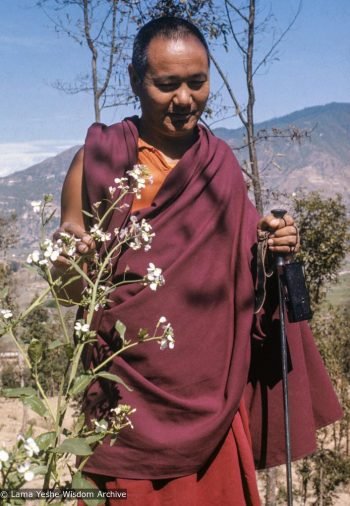
Lama Yeshe, Kopan Monastery, Nepal, 1978. Photo courtesy of Lama Yeshe Wisdom Archive.
The Lama Yeshe Wisdom Archive’s September E-letter featured the following teaching from Lama Thubten Yeshe (1935–1984), who founded FPMT with Lama Zopa Rinpoche.
Bodhichitta itself makes us so completely peaceful, so happy. The self-cherishing thought is like putting a sword or knife into our heart; our heart is really hurt, relatively and absolutely! But bodhichitta is something which makes us completely relaxed. I think bodhichitta is unbelievable; it’s the most important thing we can practice in our entire life. It makes us really happy and there’s no room for others to disturb us. Otherwise, everybody is our enemy. The opposite of bodhichitta is feeling that everybody is an enemy.
In the West, people sometimes think, “She is taking advantage; he is taking advantage; you are taking advantage.” People think that everybody takes advantage of them, but it’s not true. I know many people who think human beings take advantage of each other. Do you feel that way? I don’t know. It’s not true! Human beings have always been kind to each other, helping each other. Always. It’s our fundamental nature. So, bodhichitta helps us to relax even when we’re not meditating. Really, bodhichitta makes us content, satisfied. If somebody hits us, if somebody beats us, it’s still OK. If somebody’s criticizing us, it’s still OK. If somebody’s stealing our money, it’s still OK. If somebody does bad things to us, it’s still OK. The mind makes it OK; that’s all it is. And it’s the mind that makes it not OK, isn’t it?
So, I think bodhichitta is the best. In my opinion we all need bodhichitta, especially in Western society. If we have to integrate our practice into Western society’s working life, I think bodhichitta is the best way. Bodhichitta is definitely the best way to integrate our practice. In Western society people have very strong, concrete relationships with each other, for example, “I’m working for you,” or “You and me,” becomes so concrete. You say, “I want you to do this,” and I say, “Yes, I can do this much.” Do you know what I mean? In the beginning we have to talk to make such an incredible relationship, therefore bodhichitta is really, really important.
For me it seems like bodhichitta is the real essential. Western people can easily help others, but when we try to teach them indestructible samadhi meditation it is very difficult, because Western life is not made for that, unfortunately. Of course, we still have time. But we can practice bodhichitta so easily; we can see other people suffering, we can see our boss suffering, we can see the workers suffering, we can see so much suffering. Oh, my goodness, Western people have so much suffering, so much conflict. I really have compassion when I go to America. Californian people are sweet, they’re hardworking and physically they’re comfortable, but in their mind they’re going on an incredible trip. The more I stay, the more I have compassion for them. Really, they have so much suffering mentally. I don’t know, maybe it’s my projection, but I’m telling you my experience. I feel that those people have so much mental suffering.
So, in my opinion, bodhichitta is the best way. Bodhichitta makes our heart completely relaxed. In our life we have to deal with other peoples’ difficulties, so this helps. When people give us problems but at the same time we can be satisfied and can help them, this comes from bodhichitta. We should have bodhichitta; it is the best!
Even in a man-woman relationship, bodhichitta is very useful. A man can see the woman is suffering or the woman can see her partner is suffering—when you can see that, how can you add more suffering? Normally in relationships people hurt each other, don’t they? “I’m dissatisfied with him so I will hurt him.” Or he hurts her because he’s dissatisfied. Can you imagine? That’s the way it is. All these relationships are a disaster because they are not getting enough. You definitely decide, “I’m not getting enough from him (or her).” That is selfish—completely, purely selfish. I think that is clean clear. You hurt your partner because you are dissatisfied, because you are not getting pleasure. “I’m not getting pleasure, so I’m leaving!” That’s California style! It’s easy, isn’t it? It’s very easy. “I’m leaving. I’m dissatisfied, I’m not happy, therefore I’m leaving.” I think it’s completely selfish; it’s unbelievable! How can we always be happy with each other? We have so much garbage, so many trips inside.
How can I expect to always be happy with you? I cannot! I cannot guarantee that you people will be happy. It’s true! Therefore, you should accept it: “How can my selfish mind think it’s unfair this way? It’s not true. I should be reasonable. It’s natural that sometimes I get pleasure and sometimes I do not. I’m not happy but still I will try, and I will analyze what is wrong and why.”
This is excerpted from a question-and-answer session with Lama Yeshe during the Sixteenth Kopan Meditation Course held at Kopan Monastery, Nepal on December 8, 1983. Edited by Uldis Balodis. You can read the entire teaching here on the Lama Yeshe Wisdom Archive (LamaYeshe.com) and you can find it in the new Lama Yeshe ebook The Enlightened Experience: Collected Teachings, Volume 3.
Through timely advice, news stories, and update, FPMT.org and Mandala Publications share the wisdom culture inspired and guided by the teachings of FPMT founders Lama Thubten Yeshe and Lama Thubten Zopa Rinpoche.
- Tagged: advice from lama yeshe, bodhichitta, lama yeshe, lama yeshe advice, lama yeshe wisdom archive, lama yeshes wisdom
29
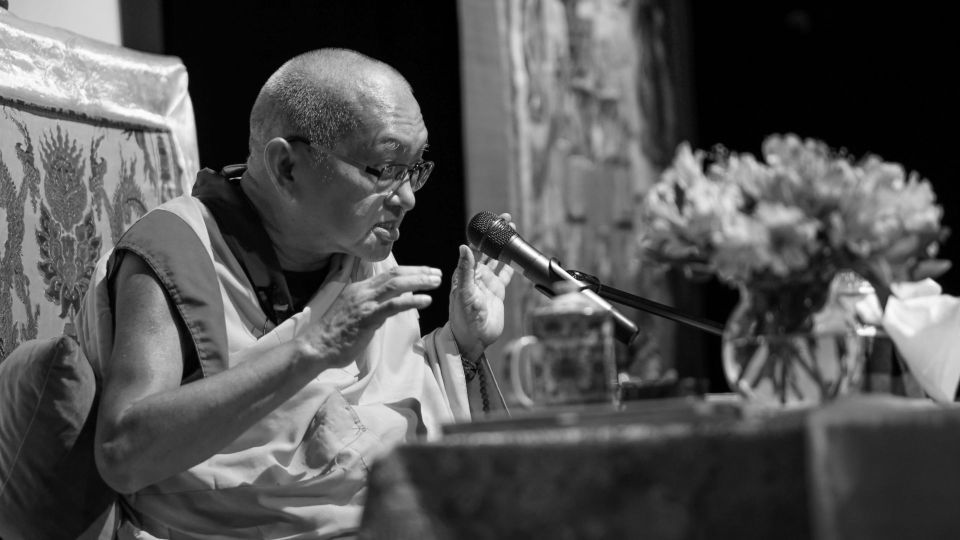
Lama Zopa Rinpoche, Thubten Norbu Ling, Santa Fe, New Mexico, United States, August 2017. Photo by Ven. Lobsang Sherab.
In a teaching titled “Sentient Beings Come before God and Mantras to Benefit Others,” part of Lama Zopa Rinpoche’s COVID-19 Crisis Teachings, Rinpoche discussed the benefits of reciting the holy name of Buddha Rinchen Tsugtor Chen. Lama Zopa Rinpoche has frequently spoken about how reciting the name of this buddha is the very first thing to do to support someone who is dying:
“When an animal or person is dying—now, this hour, today, or in several hours, whatever—the first thing to recite is [the name of Buddha Rinchen Tsugtor Chen,]” Lama Zopa Rinpoche taught in August 2017 at Thubten Norbu Ling in Santa Fe, New Mexico, in the United States.
Rinpoche continued with a recitation of the mantra and additional advice:
“CHOM DÄN DÄ DE ZHIN SHEG PA DRA CHOM PA YANG DAG PAR DZOG PÄI SANG GYÄ RIN CHHEN TSUG TOR CHÄN LA CHHAG TSHÄL LO
To Bhagavan, Tathagata, Arhat, Perfectly Complete Buddha, Precious Ushnisha, I prostrate.
“Then after that, you do a short Medicine Buddha practice. If you recite it to an animal loudly, if a person or animal hears it, they will never get born in lower realms. You must write that down in your ‘diarrhea’ [diary] book.”
In 2010 during the Light of the Path retreat, Rinpoche gave more extensive teachings on the name:
“In one of Buddha’s past life stories, it says that tens of thousands of fish were dying due to their pond having dried out. He brought water from very far away and chanted this buddha’s mantra to the fish: CHOM DÄN DÄ DE ZHIN SHEG PA DRA CHOM PA YANG DAG PAR DZOG PÄI SANG GYÄ RIN CHHEN TSUG TOR CHÄN LA CHHAG TSHÄL LO. Due to this, they were all reborn in the Deva Realm of the Thirty-Three. Then they all came down to thank him together with a rainfall of flowers. There are quite a few stories about this verse.
“It is very good to learn it and to write it down because if an animal or a person is dying, this is the very first thing to recite to them. But don’t recite it like you are reciting it for yourself, so the other person doesn’t hear it. The other person has to hear it! Don’t mumble; you have to recite it loudly. Since the person who is dying has to hear it, get near their ear and recite it loudly. Even if there are many other practices you are going to do for the dying person, phowa, Medicine Buddha puja, or any other practice, the first thing to do is to recite CHOM DÄN DÄ DE ZHIN SHEG PA DRA CHOM PA YANG DAG PAR DZOG PÄI SANG GYÄ RIN CHHEN TSUG TOR CHÄN LA CHHAG TSHÄL LO. If the other person is able to hear that, it is impossible for them to be reborn in the lower realms. Therefore, it is very important. It is also very short (Rinpoche snaps his fingers) and it is done. Whatever else you are going to do, first do that. Also, even if you cannot be sure when the person is going to die, [you can recite it because] if the person or animal hears that verse, they will never get reborn in the lower realms. Even for animals and insects, it is unbelievably powerful.”
Listen to Rinpoche recite the holy name of Buddha Rinchen Tsugtor Chen:
https://youtu.be/joH14-PjPOQ
Find more advice and video teachings by Lama Zopa Rinpoche from Kopan Monastery during the COVID-19 crisis:
https://fpmt.org/fpmt/announcements/resources-for-coronavirus-pandemic/advice-from-lama-zopa-rinpoche-for-coronavirus/
For more on mantras, visit FPMT Education’s mantra resource page:
https://fpmt.org/education/prayers-and-practice-materials/mantras/
For more practices and resources for the dead and dying, please visit:
https://fpmt.org/death/
Through comprehensive study programs, practice materials, and training seminars, FPMT Education nourishes the development of compassion, wisdom, kindness, and true happiness in individuals of all ages.
- Tagged: rinchen tsugtor chen
25
A new video from Lama Zopa Rinpoche focuses on advice for students supporting someone who is dying. Rinpoche recorded this video in March 2020 at Kopan Monastery in Nepal.
In the video, Lama Zopa Rinpoche recites various mantras and teaches on their benefits. These mantras can be used to support a person who is dying.
Rinpoche teaches on:
- Buddha’s Name Mantra (Rinchhen Tsugtorchen Name Mantra)
- the short Chenrezig mantra
- Lotus Pinnacle of Amoghaspasha Mantra
- Celestial Mansion Extremely Secret Sublime Success
- Maitreya Buddha mantras (root mantra, heart mantra, and close heart mantra)
- the short Medicine Buddha mantra
- the short Namgyalma mantra
- Mantra from “The Sutra of Great Liberation”
Watch “Lama Zopa Rinpoche’s Advice to a Person Who is Dying” on YouTube:
https://youtu.be/wmIVjkVDyVE
- Read the transcript of this teaching.
- Find the mantras to recite for the dying discussed in this video.
- Find additional resources for the dying and other mantras on FPMT.org.
For detailed advice on the practices recommended by Lama Zopa Rinpoche for the coronavirus pandemic, please visit the page “Advice from Lama Zopa Rinpoche for Coronavirus.”
Additional resources, including Dharma study-from-home opportunities, can be found on the page “Resources for the Coronavirus Pandemic.”
Lama Zopa Rinpoche is the spiritual director of the Foundation for the Preservation of Mahayana Tradition (FPMT), a Tibetan Buddhist organization dedicated to the transmission of the Mahayana Buddhist tradition and values worldwide through teaching, meditation and community service.
- Tagged: coronavirus, covid-19, death and dying, lama zopa rinpoche thought transformation video teaching, video
12
Students can now find two newly translated texts relevant to the practice of six-session guru yoga, often given in the Gelug tradition as a daily practice commitment to all those who have received a highest yoga tantric initiation, in ebook and PDF formats in the Foundation Store.
Six-Session Guru Yoga, translated by Joona Repo, contains three versions of the guru yoga practice that Phabongkha Dechen Nyingpo arranged together and briefly commented on. It is recommended by both Phabongkha and Lama Zopa Rinpoche that students practice the extensive or abbreviated versions of the practice instead of the single-verse version.
Phabongkha’s work also serves as the basis of Six-Session Guru Yoga Commentary, Lama Zopa Rinpoche’s in-depth teachings on the six-session guru yoga practice. This text, recently updated, provides Rinpoche’s commentary on the benefits of the practice, how to meditate on each verse of the sadhana, and the samayas of the five buddha families. The commentary uses the extensive version of the six-session guru yoga practice as its basis.
Note: You need to have received an initiation (wang) of the yoga tantra or highest yoga tantra class in order to read these commentaries of the six-session guru yoga. These texts are restricted to only those with the appropriate tantric initiation. If you are unsure whether you are qualified or not, please email us at education@fpmt.org.
Through comprehensive study programs, practice materials, and training seminars, FPMT Education nourishes the development of compassion, wisdom, kindness, and true happiness in individuals of all ages.
- Tagged: six-session guru yoga
29
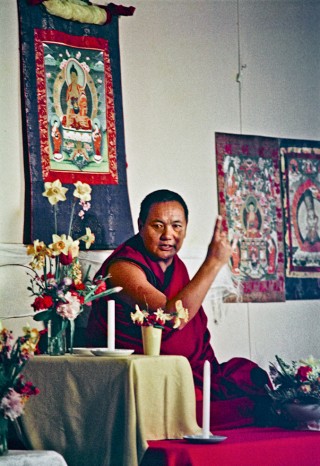
Lama Yeshe teaching at Olinda, Australia. On July, 26 1976, Lama Yeshe gave a public lecture in Melbourne. That same evening a weekend course for eighty commenced at Olinda in the Dandenong Ranges outside the city. Photo courtesy of Lama Yeshe Wisdom Archive (lamayeshe.com).
What if your dear mother were caught in a blazing fire? You would not relax and say, “Let her burn. I don’t have time to get her out right now. I’ll do it later.” Of course you would stop whatever you were doing, no matter how seemingly important, and immediately rush to rescue her. We must regard all beings as our mother – and they are indeed trapped and burning in the fire of wrong conceptions and negativities. We must not be lazy about this! We must transform every action – eating, sleeping, working – into Dharma wisdom.
But we are lazy, aren’t we? Our impure mind lets us live life as if it were a tea party: “Let my mother burn – I’ll pull her out of the fire when I’ve finished enjoying myself.” Of course, we do not say these words, but our inner feeling, beyond words, reflects this attitude. Be careful; we often behave like this.
All the same, we don’t need to get too emotional about all this. If I pump you up too much, you’ll get overexcited and not want to do anything but run off to the mountains to meditate or run off preaching that everybody should practice Buddhism just like you do. That becomes another problem.
– Lama Yeshe, from When the Chocolate Runs Out, published by Wisdom Publications
Lama Yeshe was the founder of the Foundation for the Preservation of Mahayana Tradition (FPMT), a Tibetan Buddhist organization dedicated to the transmission of the Mahayana Buddhist tradition and values worldwide through teaching, meditation and community service.
- Tagged: lama yeshe, when the chocolate runs out
- 0
20
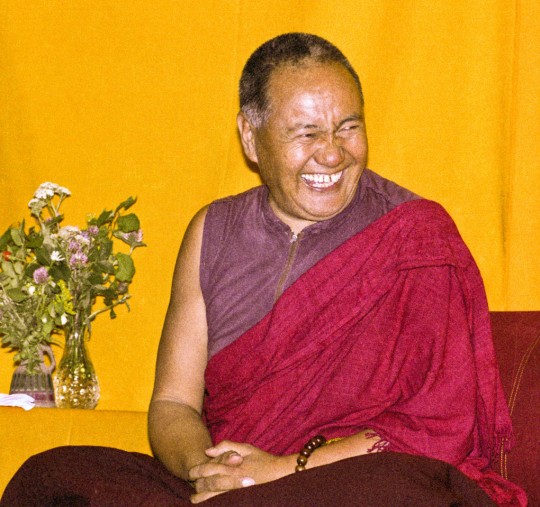
Over one weekend at Barnens O on Vaddo in September of 1983, Lama Yeshe gave a meditation course which later was published in English called “Light of Dharma,” translated into Swedish as “Lamas ljus.” Photo by Holger Hjorth, from Lama Yeshe Wisdom Archive (lamayeshe.com).
If someone’s giving you a hard time and your ego starts to hurt, instead of reacting, just take a look at what’s going on. Think of how sound is simply coming out of the other person’s mouth, entering your ear, and causing pain in your heart. If you think about this in the right way, it will make you laugh; you will see how ridiculous it is to get upset by something so insubstantial.
– Lama Yeshe, from When the Chocolate Runs Out, published by Wisdom Publications
Lama Yeshe was the founder of the Foundation for the Preservation of Mahayana Tradition (FPMT), a Tibetan Buddhist organization dedicated to the transmission of the Mahayana Buddhist tradition and values worldwide through teaching, meditation and community service.
- Tagged: lama yeshe, when the chocolate runs out
- 0
8
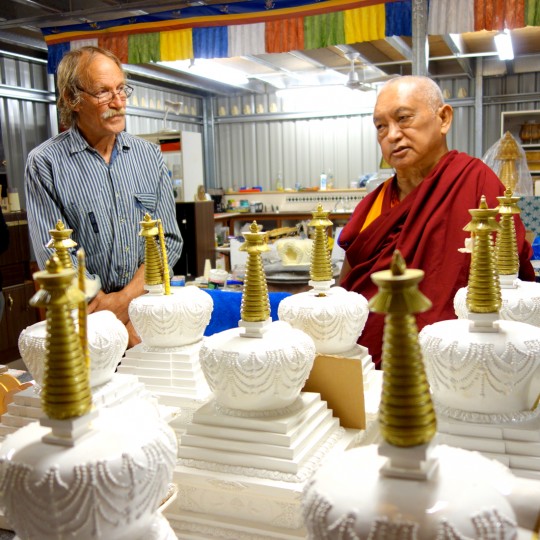
Lama Zopa Rinpche with Garrey Foulkes in the recently completed art studio at Chenrezig Institute, Eudlo, Queensland, Australia, September 2014. Photo by Ven. Roger Kunsang.
“… Every time you look at holy objects – pictures of the Buddha, statues, scriptures, stupas – they plant the seed of liberation and enlightenment in your mental continuum. So every time you look at them they purify your mind. They plant the seed of enlightenment, which includes all the causes to achieve enlightenment,” Lama Zopa Rinpoche instructs in “Why Holy Objects Are Precious and Wish-fulfilling.”
“How? When you look at them they plant a seed or positive imprint on your mental continuum so that later when you meet Buddhadharma, either in this life or in future lives, you are able to understand the words and the meaning of the teachings. From that, you are able to practice the meaning of the Dharma you have understood, which causes you to cease the gross and subtle defilements by actualizing the path and then your mental continuum becomes omniscient mind. This is what is meant when we say that by seeing holy objects it plants the seed of enlightenment on the mind – it contains the whole path from guru devotion and the three principals up to the two stages of tantra and enlightenment. Seeing holy objects makes us actualize all of this as a result. This is the effect we get from seeing them and this is how they cause us to achieve enlightenment. …”
You can read the complete advice “Why Holy Objects Are Precious and Wish-fulfilling” as a PDF found with other advice from Rinpoche on holy objects on FPMT.org.
Learn more about Lama Zopa Rinpoche, spiritual director of the Foundation for the Preservation of Mahayana Tradition (FPMT), and Rinpoche’s vision for a better world. Sign up to receive news and updates.
- Tagged: advice, holy objects, lama zopa rinpoche
- 0
1
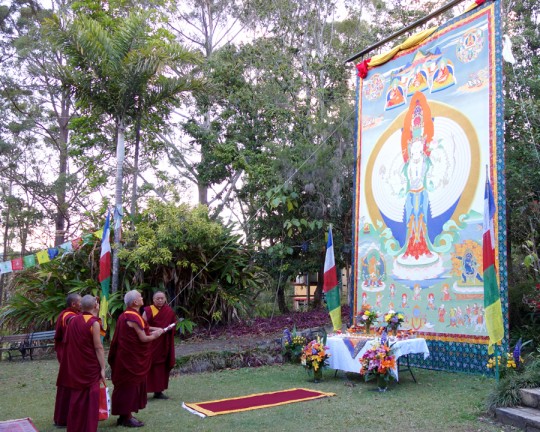
Lama Zopa Rinpoche with large Chenrezig thangka at Chenrezig Institute, Eudlo, Queensland, Australia, September 2014. Photo by Ven. Roger Kunsang.
“… Having a positive attitude, such as the altruistic thought to help other sentient beings and not harm them, is the cause of success in life. Even though some people might not have much education, they have no difficulties in life; they are wealthy and have harmonious relationships, and whatever they wish for happens. The reason for this is the cause created in the past. This is the actual evolution; this is where their happiness comes from. But when we do not analyze, when we are not aware, it looks as if success came from outside and does not depend on their mind,” Lama Zopa Rinpoche said in a teaching from 1991 recently published on the Lama Yeshe Wisdom Archive.
“It’s the opposite for people who are experiencing difficulties in their life. Their actions are motivated by ill will, jealousy, selfishness, dissatisfaction, desire, ignorance, anger and so forth, and their problems and difficulties result from that. Even though this is the actual evolution, when we do not understand or are not aware of karma, of action and result, it appears as if success and difficulties come from outside. We may have heard of karma and sometimes talk about it or meditate on it, but we are not aware of it in our everyday life.
“Happiness and success in life depends on transforming the mind, on making the mind better. Through that our actions become better; it depends on developing a positive attitude. Our mental continuum has all the potential to be completely transformed into the right path; we can completely purify all the negative imprints left on our mental continuum by our negative actions, which produce the problems in our life. Transforming our mind makes it impossible to experience the action and the resultant problems. Our mental continuum has all this potential.
“Therefore, meditation is extremely important in our life. It is the most important method for obtaining happiness in our everyday life. If we think more broadly, meditation brings not only temporary happiness but especially ultimate happiness, the peerless happiness of full enlightenment – when this mental continuum is completely pure, free of every single mistake, even the subtle imprints, the obscurations, and has completed all the qualities, all the realizations. Then we are able to bring everyone else to the peerless happiness of full enlightenment by freeing them from all their problems and obscurations, from their disturbing thoughts and even the imprints left on the mind. We have a fully knowing mind, having completed training the mind in compassion and having the perfect power to guide everyone according to the level of their mind. …”
You can read the complete teaching “Transforming the Mind in Everyday Life” on the Lama Yeshe Wisdom Archive.
Lama Zopa Rinpoche is the spiritual director of the Foundation for the Preservation of Mahayana Tradition (FPMT), a Tibetan Buddhist organization dedicated to the transmission of the Mahayana Buddhist tradition and values worldwide through teaching, meditation and community service.
- Tagged: advice, lama zopa rinpoche
- 0
28
“… Many different conditions can cause stress: the fear of your partner dying or of losing them to someone else, failure in business, loss of a job, illness, or not getting some person or object that you want. With desires focused solely on the happiness of this life, you worry that you will not obtain the pleasures you selfishly seek. This dissatisfied, desirous mind is one of the main causes of stress,” Lama Zopa Rinpoche said in a teaching in 1990 in Sydney, Australia, that has been recently published on the Lama Yeshe Wisdom Archive.
“The general method to deal with stress is to look at life in a positive rather than negative way. Looking positively at your problems is itself a meditation that transforms the mind into happiness. Reflecting on the benefits of your problems releases your squeezed, uptight mind and brings relaxation in your heart.
“Another approach is to meditate on experiencing the problem you are going through on behalf of others. Think, ‘I am experiencing this problem on behalf of all other beings. Instead of allowing countless other human beings to experience it, I alone will take all these problems upon myself, so that all others can be free of them.’ This attitude stops the problem because it purifies the cause of the problem, which is within your mind. Purifying the cause solves the problem. Experiencing your problems in this way keeps your mind happy and benefits others. And when your problem benefits others, it benefits you. …”
You can read the complete teaching, “How to Be Happy,” on the Lama Yeshe Wisdom Archive. Parts of this teaching have also been published in Wisdom Publication’s book How to Be Happy by Lama Zopa Rinpoche.
More information, photos and updates about FPMT spiritual director Lama Zopa Rinpoche can be found on Rinpoche’s webpage. If you’d like to receive news of Lama Zopa Rinpoche via email, sign up to Lama Zopa Rinpoche News.
- Tagged: advice, lama zopa rinpoche
- 0
25
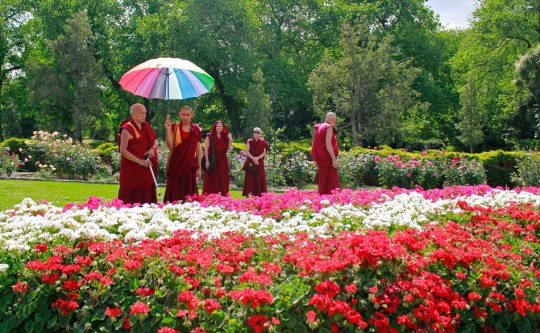
Lama Zopa Rinpoche in the park, Bendigo, Victoria, Australia, October 2014. Photo by Ven. Lobsang Sherab.
“Offering one tiny flower to a statue or picture of Buddha receives immeasurable, limitless, merit. All the paths to happiness result from that. With just one grain of rice or one tiny flower, you can enter the path and achieve total enlightenment – the completion of all good qualities,” Lama Zopa Rinpoche advised.
“After achieving enlightenment, you can liberate so many sentient beings from so much suffering and samsara and bring them to enlightenment. This is the result of offering one tiny flower. Each offering has all this benefit – like putting money in the bank. One dollar equals one billion trillion dollars in interest. This is an amazing benefit. It is important to remember this every day and offer as much as possible. If you see a beautiful flower, you visualize offering it to the guru and Buddha. The result and benefit is incredible. You can offer every single flower in a garden – the merit received is mind-blowing.
“This is how you use your precious human life, which is extremely rare and hard to find. Every time you see an object, use it to become closer to liberation and enlightenment. Many times each day, use your precious human rebirth to bring you closer and closer to liberation and enlightenment and thus to enlighten all sentient beings.”
Read more of Lama Zopa Rinpoche’s on “Offering Practices” in “Lama Zopa Rinpoche’s Online Advice Book,” which is part of the Lama Yeshe Wisdom Archive.
Learn more about Lama Zopa Rinpoche, spiritual director of the Foundation for the Preservation of Mahayana Tradition (FPMT), and Rinpoche’s vision for a better world. Sign up to receive news and updates.
- Tagged: advice, lama zopa rinpoche, offerings
- 0
21
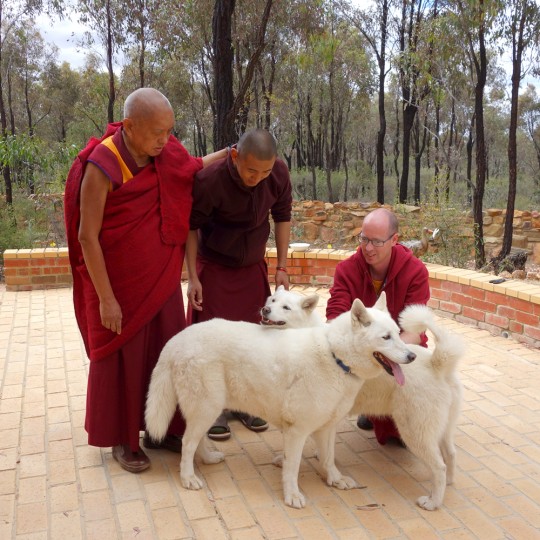
Lama Zopa Rinpoche blessing dogs at Thubten Shedrup Ling Monastery, Bendigo, Australia, October 2014. Photo by Ven. Roger Kunsang.
Lama Zopa Rinpoche has given much advice on benefiting animals. Here is a suggestion for helping your pets and other animal friends:
“It’s also extremely good to bless food before you give it to animals. If you can’t do it for every meal, then you can bless all the food at the same time. Recite the five powerful mantras or OM MANI PADME HUM, Medicine Buddha, and Milarepa mantras. All of these have power and help anyone who eats this food to not be reborn in the lower realms; it blesses their mind and purifies negative karma. If you can, do it every time you feed them – recite the mantras and blow on the food. This is the biggest gift you can offer them: it causes a good rebirth, so they can escape samsara, achieve liberation, and acquire the positive imprints of the Mahayana teachings and mantras that lead to enlightenment.
“I asked the people who take care of our dogs at Tushita Centre in Dharamsala to recite the Maitreya Buddha prayer and mantra, the Lama Tsongkhapa praise to Guru Shakyamuni Buddha – ‘Having Found the Realization of Dependent Arising’ – and other prayers and mantras to the dogs, while holding a biscuit in their hand, so all the dogs wait patiently. It looks like they are respectfully listening to the teachings, with their eyes looking at the biscuit, all sitting humbly.”
Read more of Lama Zopa Rinpoche’s instructions “How to Benefit Animals” on “Lama Zopa Rinpoche’s Online Advice Book,” which is part of the Lama Yeshe Wisdom Archive.
More information, photos and updates about FPMT spiritual director Lama Zopa Rinpoche can be found on Rinpoche’s webpage. If you’d like to receive news of Lama Zopa Rinpoche via email, sign up to Lama Zopa Rinpoche News.
- Tagged: advice, animals, lama zopa rinpoche
- 0
18
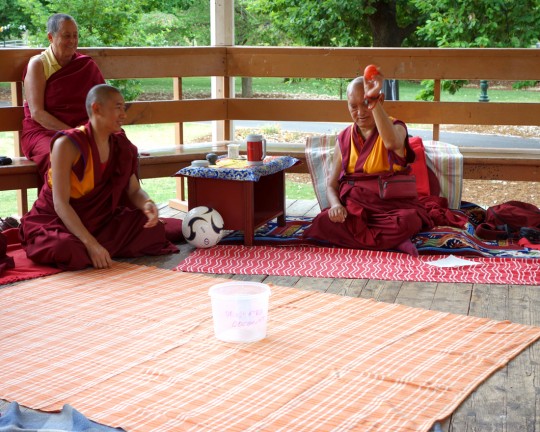
Lama Zopa Rinpoche practices tossing a small ball into a bucket during a picnic in Bendigo, Australia, October 2014. Photo by Ven. Roger Kunsang.
“People put a lot of effort into climbing Mount Everest, but it means nothing. They spend millions of dollars climbing Mount Everest just to get a reputation, just to get some dry name,” Lama Zopa Rinpoche taught to the students of the 33rd Kopan Course in 2000. “They put so many hundreds of thousands of dollars into a project which is totally meaningless. People spend so much money and effort and for their whole life they put effort into things which are totally meaningless and they only create negative karma, because their motivation is just attachment. It means nothing, and they totally waste all their money and their life, because they put so much effort for so many years into nothing.
“There are so many people in the world who have received a precious human body but are totally wasting it by doing meaningless actions. So, it is very important, while we are here, to follow the path to enlightenment. Even if we die while doing prostrations to the Buddha, we are still practicing Dharma, so if we die it is worthwhile. …”
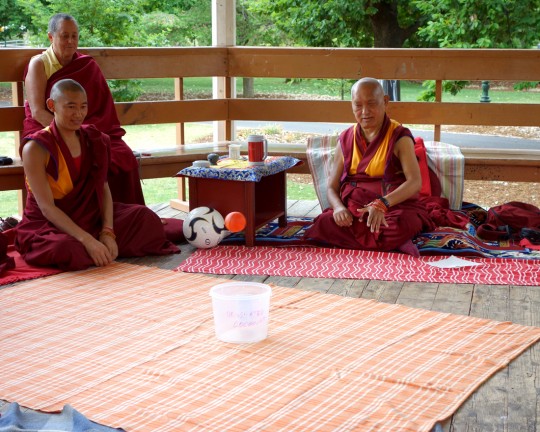
Lama Zopa Rinpoche practices tossing a small ball into a bucket during a picnic in Bendigo, Australia, October 2014. Photo by Ven. Roger Kunsang.
Excerpted from the teaching “Putting Effort into Dharma Practice” found at the Lama Yeshe Wisdom Archive.
More information, photos and updates about FPMT spiritual director Lama Zopa Rinpoche can be found on Rinpoche’s webpage. If you’d like to receive news of Lama Zopa Rinpoche via email, sign up to Lama Zopa Rinpoche News.
- Tagged: joyful effort, lama zopa rinpoche
- 0
- Home
- News/Media
- Study & Practice
- About FPMT Education Services
- Latest News
- Programs
- New to Buddhism?
- Buddhist Mind Science: Activating Your Potential
- Heart Advice for Death and Dying
- Discovering Buddhism
- Living in the Path
- Exploring Buddhism
- FPMT Basic Program
- FPMT Masters Program
- FPMT In-Depth Meditation Training
- Maitripa College
- Lotsawa Rinchen Zangpo Translator Program
- Universal Education for Compassion & Wisdom
- Online Learning Center
- Prayers & Practice Materials
- Overview of Prayers & Practices
- Full Catalogue of Prayers & Practice Materials
- Explore Popular Topics
- Benefiting Animals
- Chenrezig Resources
- Death & Dying Resources
- Lama Chopa (Guru Puja)
- Lama Zopa Rinpoche: Compendium of Precious Instructions
- Lama Zopa Rinpoche: Life Practice Advice
- Lama Zopa Rinpoche Practice Series
- Lamrim Resources
- Mantras
- Prayer Book Updates
- Purification Practices
- Sutras
- Thought Transformation (Lojong)
- Audio Materials
- Dharma Dates – Tibetan Calendar
- Translation Services
- Publishing Services
- Teachings and Advice
- Find Teachings and Advice
- Lama Zopa Rinpoche Advice Page
- Lama Zopa Rinpoche: Compendium of Precious Instructions
- Lama Zopa Rinpoche Video Teachings
- ༧སྐྱབས་རྗེ་བཟོད་པ་རིན་པོ་ཆེ་མཆོག་ནས་སྩལ་བའི་བཀའ་སློབ་བརྙན་འཕྲིན།
- Podcasts
- Lama Yeshe Wisdom Archive
- Buddhism FAQ
- Dharma for Young People
- Resources on Holy Objects
- Ways to Offer Support
- Centers
- Affiliates Area
- Teachers
- Projects
- Charitable Projects
- Make a Donation
- Applying for Grants
- News about Projects
- Other Projects within FPMT
- Support International Office
- Projects Photo Galleries
- Give Where Most Needed
- FPMT
- Shop
Subscribe to FPMT News
Translate*
*powered by Google TranslateTranslation of pages on fpmt.org is performed by Google Translate, a third party service which FPMT has no control over. The service provides automated computer translations that are only an approximation of the websites' original content. The translations should not be considered exact and only used as a rough guide.Bad Education is like a prison. We must learn to open the prison, and psychologically liberate human beings.







